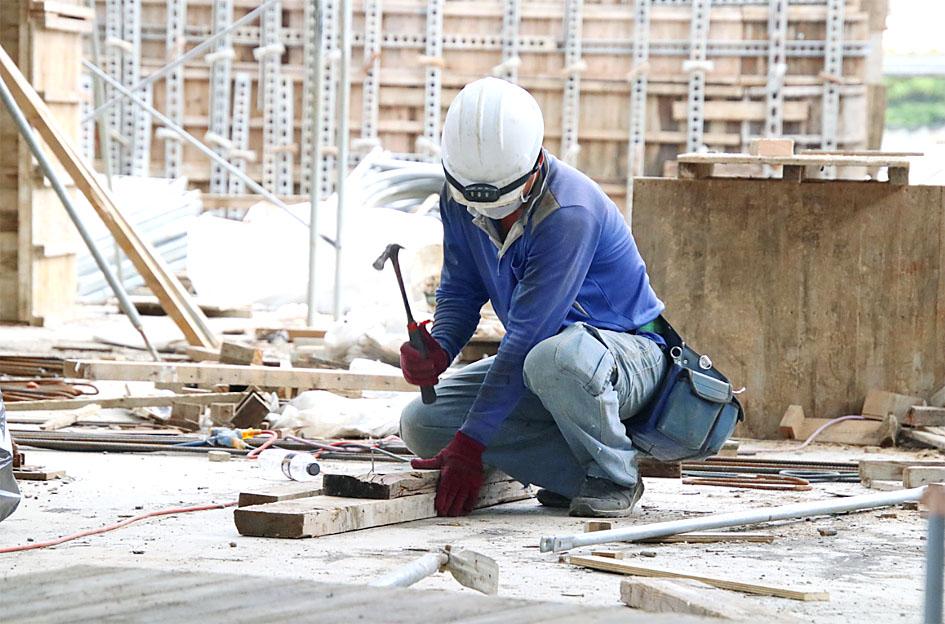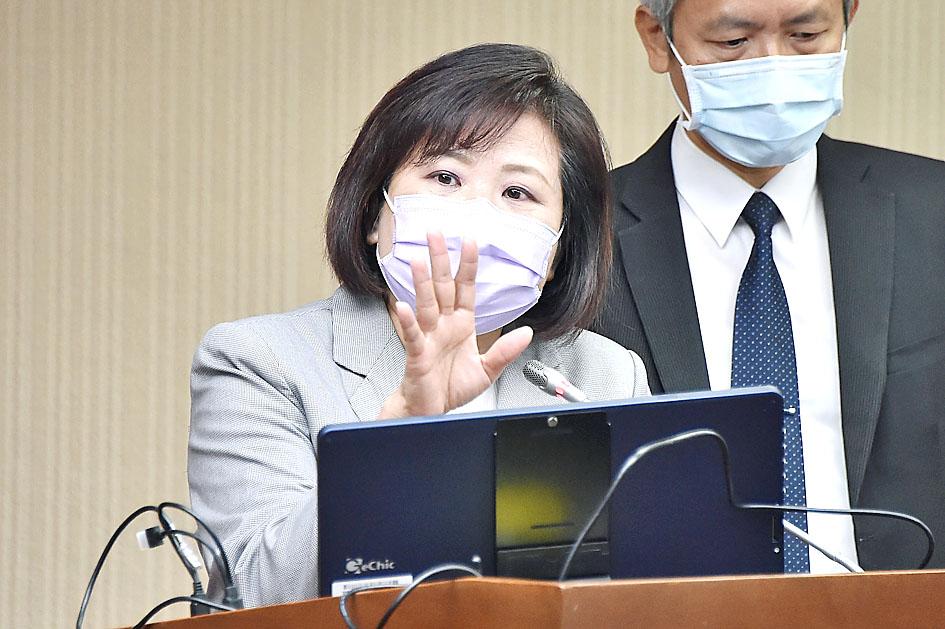Most companies frown on the government’s suggestion that wages be increased next year, while only 93 percent could tolerate a 3 percent increase, as soaring materials and labor costs squeeze their profit margins, a survey released yesterday by the Chinese National Federation of Industries (CNFI, 全國工業總會) found.
The plea came one day before the Ministry of Labor is to discuss the matter, after floating an increase of at least 3 percent.
The Taipei-based trade group pressed the government to take a cautious approach, as a big majority of its member companies are seeing revenue and profit decline, even though Taiwan’s GDP growth is expected to hit 6 percent this year.

Photo: CNA
“A majority of the surveyed companies disagree with the proposed wage hike because only 17.5 percent of them have seen a pickup in sales and earnings, and would not be affected,” said the group, which consists of 159 associations and represents a majority of local manufacturers.
Local electronics suppliers have reaped a windfall from a surge in demand for devices used in distance learning and remote working during the COVID-19 pandemic, which has restricted business in most other sectors, the survey showed.
Small and medium-sized enterprises have especially felt the pinch of spiking raw materials and labor costs as they have difficulty passing on extra costs to their customers, the group said.

Photo: Tu Chien-jung, Taipei Times
About 50 percent of manufacturers said that their revenue declined in the first three quarters of this year, while nearly 60 percent saw profitability weaken, it added.
Makers of textile products have fared worse, as 69 percent reported topline shrinkage and 78 percent experienced a decrease in their bottom line, it said.
Yesterday, Minister of Labor Hsu Ming-chun (許銘春) told a meeting of the legislature’s Social Welfare and Environmental Hygiene Committee that she is confident a wage hike of at least 3 percent can be enacted next year given the nation’s vibrant economy.
However, Hsu stressed that the extent of the increase would not be determined until the ministry’s Minimum Wage Review Committee convenes today.
The current minimum monthly wage is NT$24,000, while the minimum hourly wage is NT$160.
If the minimum wage hike is confirmed, the government would focus on proving subsides to companies that have been financially affected by the COVID-19 crisis, Hsu said, declining to give further details.
She ruled out the possibility of only increasing the minimum wage in certain industries, saying that once the review committee reaches a decision and it is approved by the Cabinet, the policy would be rolled out in all sectors.
However, the CNFI survey showed that if the government insists on a pay hike, 93 percent of the polled companies said that they could only accept an increase of up to 3 percent, adding that a larger increase would hurt their operations.
The change would raise the minimum monthly wage to NT$24,720 and the minimum hourly wage to NT$164.8, the group said.
The government must not tackle the issue by generalizing that all companies are enjoying as strong earnings growth as local high-tech firms, the group added.
Local semiconductor firms lead their sector in the global market and make a significant contribution to the nation’s GDP growth, the group said.
Service-oriented sectors, on the other hand, have taken a hard hit from the COVID-19 situation over the past two years without a cure in sight yet, it said.
Additional reporting by CNA

Tropical Storm Usagi strengthened to a typhoon yesterday morning and remains on track to brush past southeastern Taiwan from tomorrow to Sunday, the Central Weather Administration (CWA) said yesterday. As of 2pm yesterday, the storm was approximately 950km east-southeast of Oluanpi (鵝鑾鼻), Taiwan proper’s southernmost point, the CWA said. It is expected to enter the Bashi Channel and then turn north, moving into waters southeast of Taiwan, it said. The agency said it could issue a sea warning in the early hours of today and a land warning in the afternoon. As of 2pm yesterday, the storm was moving at

DISCONTENT: The CCP finds positive content about the lives of the Chinese living in Taiwan threatening, as such video could upset people in China, an expert said Chinese spouses of Taiwanese who make videos about their lives in Taiwan have been facing online threats from people in China, a source said yesterday. Some young Chinese spouses of Taiwanese make videos about their lives in Taiwan, often speaking favorably about their living conditions in the nation compared with those in China, the source said. However, the videos have caught the attention of Chinese officials, causing the spouses to come under attack by Beijing’s cyberarmy, they said. “People have been messing with the YouTube channels of these Chinese spouses and have been harassing their family members back in China,”

The Central Weather Administration (CWA) yesterday said there are four weather systems in the western Pacific, with one likely to strengthen into a tropical storm and pose a threat to Taiwan. The nascent tropical storm would be named Usagi and would be the fourth storm in the western Pacific at the moment, along with Typhoon Yinxing and tropical storms Toraji and Manyi, the CWA said. It would be the first time that four tropical cyclones exist simultaneously in November, it added. Records from the meteorology agency showed that three tropical cyclones existed concurrently in January in 1968, 1991 and 1992.

GEOPOLITICAL CONCERNS: Foreign companies such as Nissan, Volkswagen and Konica Minolta have pulled back their operations in China this year Foreign companies pulled more money from China last quarter, a sign that some investors are still pessimistic even as Beijing rolls out stimulus measures aimed at stabilizing growth. China’s direct investment liabilities in its balance of payments dropped US$8.1 billion in the third quarter, data released by the Chinese State Administration of Foreign Exchange showed on Friday. The gauge, which measures foreign direct investment (FDI) in China, was down almost US$13 billion for the first nine months of the year. Foreign investment into China has slumped in the past three years after hitting a record in 2021, a casualty of geopolitical tensions,